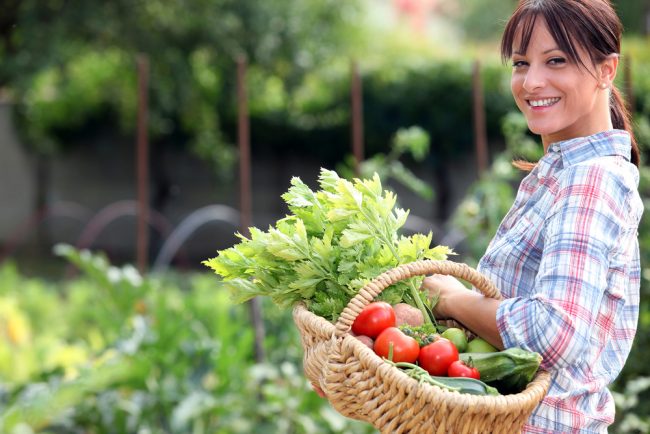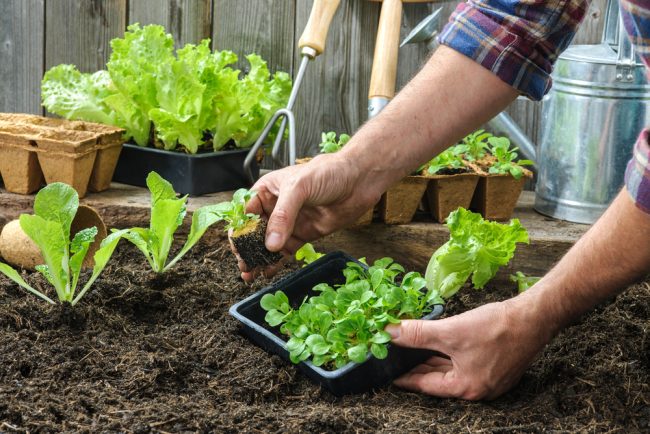It’s a relief.
You think you’ve done all the hard work. You took the effort to start your own seeds. You carefully prepared your garden soil. And your vegetable plants are starting to grow. It’s time to sit back, relax, and get ready to reap the harvest. Well, not quite. Like most things in life, your vegetable garden needs regular care. That’s if you want to grow strong, healthy plants that give you the best harvest of vegetables. Don’t worry. It’s not difficult. Follow these steps to maintain your vegetable garden and you’ll get the best out of it.
1) Give Your Plants The Support They Need
Some plants are like kids. They need support to grow into the strong, healthy beings they can become. Plants like tomatoes, cucumbers, and pole beans like to sprawl around the garden. But it’s much better to give them support like a trellis or bamboo canes. Some of these plants will vine along the support but others need to be tied to the support every few inches. The benefit of supporting plants is you can grow more plants in less space with vertical gardening. Since the leaves and fruits are above the soil, they are protected from several pests and diseases. Since the foliage has more exposure to sunlight, they produce more chlorophyll which means your vegetables taste better. And it’s a lot easier to harvest the vegetables when they’re ready.
2) Give Your Plants The Resource They Crave
Your plants need water. Some more than others. You can check how dry the soil is. If there’s no moisture, it’s time to water the plants. They need at least an inch of water every week. They might need more water in hot weather especially if you’re growing in containers. You might need to water the plants several times a day. If your plants don’t get water, the foliage will wilt and the fruit will rot away. And if your plants get too much water, the roots will rot. You can’t just rely on rain to do the job. It’s unpredictable and not good for the plants. The best things to do is have a timed drip irrigation system that can water the roots without wasting water. If you’re on a budget, you can water the plants yourself but remember to do so. You can plant your garden near a water source so you’ll be reminded to water them as you walk in the garden.
3) Feed Your Plants The Nutrition They Deserve
Plants love to grow in soil that has rich, organic matter. If you’ve done a good job preparing the soil, you’ll have added compost to it. You must have tested the soil to understand if there are any deficiencies in the nitrogen, phosphorus, and potassium. And you must have corrected such deficiencies by using a fertilizer with the right balance of these three nutrients. Now that your vegetable plants are growing, you need to provide them with the right nutrients. The organic matter in your garden will keep reducing as plants take in the nutrients. So it’s best to keep adding compost when the level goes down.
It takes time for the compost to work so it would be beneficial to add some fertilizer to your garden as well. You can use an organic, water-soluble fertilizer but make sure to water the soil well before you use it.
4) Provide A Natural Blanket To The Soil
Mulch is the thick layer of organic or inorganic material you blanket your soil with. This layer helps keep the soil temperature regulated without extreme fluctuations. It also keeps the right amount of air and moisture in the soil. The thick layer of mulch does not allow weed seeds to sprout and kills them. Predatory insects thrive in such mulch and eat up the pests that can harm your plants. You can use organic mulch such as grass clippings, hay, straw, and wood bark. They will protect your garden plants and slowly decompose forming rich, organic matter. So you’ll need to replenish them periodically. If you use inorganic mulch like stone pellets or plastic sheets, you don’t need to replace them for a long time. But they don’t help provide organic matter to the soil.
5) Remove Unwanted Guests From The Garden
Weeds can be a real pain. They choke up your plants and steal nutrients and water from them. The best thing you can do is remove the weeds before you plant your vegetable garden. And once you have your garden, lay a thick layer of mulch that will prevent the weed seeds from sprouting. Check your garden every few days to see if there are any weeds growing. Pluck them out and throw them in your compost pile.
6) Grow Plants To Feed Your Plants
You’ll grow vegetables in your garden during the growing season. But for the rest of the year, your garden will be empty. And an empty garden attracts unwanted pests and weeds. The weather elements tend to erode the soil and drain the nutrients from it. But there’s something you can do to prevent this problem. You can grow cover crops in the fall. The cover crops will protect your garden from weeds and keep the soil enriched. Before they can go to seed, you need to till the cover crops into the ground. They will decompose and provide your garden with organic matter for the next growing season.
7) Take Out The Plants You Don’t Need
You planted several seeds in your vegetable garden. And there are several plants that have sprouted from them. But this can be a problem. The plants close to each other will compete for nutrients and water. So it’s best to thin them out. This means you keep the healthiest plant and pluck out the remaining so the single plant gets all the resources. If you have root vegetables, you can trim the leaves so most of the nutrients go to the root. If you have vegetables that bear fruit like tomatoes, you can trim the leaves and suckers, so the plants spend most of their energy on growing fruit.
CONCLUSION
These steps are easy. Follow them and you’ll have the best vegetable garden. Your plants will grow strong and healthy. And you’ll get the harvest of fruits, vegetables, and roots that you deserve.
So go out to your garden and start working!
Photo Credits
Photos are from DepositPhotos.com
Guest Author Bio
Kevin Rodrigues
 Kevin Rodrigues is a developer-turned-blogger that helps people learn about gardening. He posts tips and guides about growing your own vegetables on his website.
Kevin Rodrigues is a developer-turned-blogger that helps people learn about gardening. He posts tips and guides about growing your own vegetables on his website.
Website: Gardening Mentor
Recent Guest Author Articles:
- How Strong Business Training Translates Into Everyday Decision-Making
- New Career and Degree Paths for Educators Who Want to Make a Broader Impact
- Finding the Right Plumber in Portland: A Comprehensive Guide for Homeowners
- Why Choose Elara Caring for Jackson, MI Home Health Services?
- How I Turned Poetry into a Paycheck




Please Share Your Thoughts - Leave A Comment!